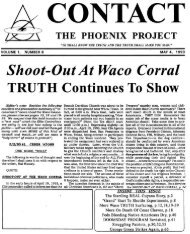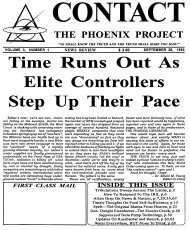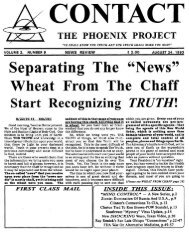The Phoenix Project 930413 - CONTACT Phoenix Journal Review
The Phoenix Project 930413 - CONTACT Phoenix Journal Review
The Phoenix Project 930413 - CONTACT Phoenix Journal Review
Create successful ePaper yourself
Turn your PDF publications into a flip-book with our unique Google optimized e-Paper software.
APRIL 13, 1993 Page 47<br />
ARTICLE VIII<br />
THE JUDICIAL BRANCH<br />
SECTION 1. <strong>The</strong>re shall be a Principal<br />
Justice of the Newstates for America; a<br />
Judicial Council; and a Judicial Assembly.<br />
<strong>The</strong>re shall also be a Supreme Court and a<br />
High Court of Appeals; also Courts of<br />
Claims, Rights and Duties, Administrative<br />
<strong>Review</strong>, Arbitration Settlements, Tax Ap-<br />
peals, and Appeals from Watchkeeper's<br />
Findings. <strong>The</strong>re shall be Circuit Courts to<br />
be of first resort in suits brought under<br />
national law; and they shall hear appeals<br />
from courts of the Newstates.<br />
Other courts may be established by law<br />
on recommendation of the Principal Jus-<br />
tice with the Judicial Council.<br />
SECTION 2. <strong>The</strong> Principal Justice shall<br />
preside over the judicial system, shall ap-<br />
point the members of all national courts,<br />
and, unless the Judicial Council object,<br />
shall make its rules; also, through an<br />
Administrator, supervise its operations.<br />
SECTION 3. <strong>The</strong> Judicial Assembly<br />
shall consist of Circuit Court Judges, to-<br />
gether with those of the High Courts of the<br />
Newstates of America and 'those of the<br />
highest courts of the Newstates. It shall<br />
meet annually, or at the call of the Princi-<br />
pal Justice, to consider the state of the<br />
Judiciq and such other matters as may<br />
be laid before it.<br />
It shall also meet at the call of the<br />
Convener to nominate three candidates for<br />
the principal Justiceship whenever a va-<br />
cancy shall occur. From these nominees<br />
the Senate shall choose the one having the<br />
most votes.<br />
SECTION 4. <strong>The</strong> Principal Justice, un-<br />
less the Senate object to any, shall appoint<br />
a Judicial Council of five members to serve<br />
during his incumbency. He shall desig-<br />
nate a senior member who shall preside in<br />
his absence.<br />
It shall be the duty of the Council, under<br />
the direction of the Principal Justice, to<br />
study the courts in operation, to prepare<br />
codes of ethics to be observed by members,<br />
and to suggest changes in procedure. <strong>The</strong><br />
Council may ask the advice of the Judicial<br />
Assembly.<br />
It shall also be a duty of the Council, as<br />
hereinafter provided, to suggest Constitu-<br />
tional amendments when they appear to be<br />
necessary; and it shall also draft revisions<br />
if they shall be required. Further it shall<br />
examine, and from time to time cause to be<br />
revised, civil and criminal codes; these,<br />
when approved by the Judicial Assembly,<br />
shall be in effect throughout the nation.<br />
SECTION 5. <strong>The</strong> Principal Justice shall<br />
have a term of eleven years; but if at any<br />
time the incumbent resign or be disabled<br />
from continuing in office, as may be deter-<br />
mined by the Senate, replacement shall be<br />
by the senior member of the Judicial Coun-<br />
cil until a new selection be made.. After six<br />
years the Assembly may provide, by a two-<br />
thirds vote, for discontinuance in office,<br />
and a successor shall then be chosen.<br />
SECTION 6. <strong>The</strong> Principal Justice may<br />
suspend members of any court for inca-<br />
pacity or violation of rules; and the separa-<br />
tion shall be final if a majority of the<br />
Council agree.<br />
SECTION 7. A presiding judge may<br />
decide, with the concurrence of the senior<br />
judge, that there may be pretrial proceed-<br />
ings, that criminal trials shall be con-<br />
ducted by either investigatory or adversary<br />
proceedings, and whether there shall be a<br />
jury and what the number of jurors shall<br />
be; but investigatory proceedings shall re-<br />
quire a bench of three.<br />
SECTION 8. In deciding on the concor-<br />
dance of statutes with the Constitution,<br />
the Supreme Court shall return to the<br />
House of Representatives such as it cannot<br />
construe. If the House fail to make return<br />
within ninety days the Court may inter-<br />
pret.<br />
SECTION 9. <strong>The</strong> Principal Justice, or<br />
the President, may grant pardons or re-<br />
prieve s.<br />
SECTION 10. <strong>The</strong> High Courts shall<br />
have thirteen members; but nine mem-<br />
bers, chosen by their senior justices from<br />
time to time, shall constitute a court. <strong>The</strong><br />
justices on leave shall be subject to recall.<br />
Other courts shall have nine members;<br />
but seven, chosen by their senior, shall<br />
constitute a court.<br />
All shall be in continuous session ex-<br />
cept for recesses approved by the Principal<br />
Justice.<br />
SECTION 1 1. <strong>The</strong> Principal Justice, with<br />
the Council, may advise the Senate, when<br />
requested, concerning the appropriateness<br />
of measures approved by the House of<br />
Representatives; and may also advise the<br />
President, when requested, on matters he<br />
may refer for consultation.<br />
SECTION 12. It shall be for other<br />
branches to accept and to enforce judicial<br />
decrees.<br />
SECTION 13. <strong>The</strong> High Court of Appeals<br />
may select applications for further consid-<br />
eration by the Supreme Court of decisions<br />
reached by other courts, including those of<br />
the Newstates. If it agree that there be a<br />
constitutional issue it may make prelimi-<br />
naryjudgment to be reviewed without hear-<br />
ing, and finally, by the Supreme Court.<br />
SECTION 14. <strong>The</strong> Supreme Court may<br />
decide:<br />
a. Whether, in litigation coming to it<br />
on appeal, constitutional provisions have<br />
been violated or standards have not been<br />
met.<br />
b. On the application of constitu-<br />
tional provisions to suits involving the<br />
Newstates.<br />
c. Whether international law, as rec-<br />
ognized in treaties, United Nations agree-<br />
ments, or arrangements with other ea-<br />
tions, has been ignored or violated.<br />
d. Other causes involving the inter-<br />
pretation of constitutional provisions; ex-<br />
cept that in holding any branch to have<br />
exceeded its powers the decision shall be<br />
suspended until the Judicial Court shall<br />
have determined whether, in order to avoid<br />
confrontation, procedures for amendment<br />
of the Constitution are appropriate.<br />
If amendatory proceedings are insti-<br />
tuted, decision shall await the outcome.<br />
SECTION 15. <strong>The</strong> Courts of the<br />
Newstates shall have initial jurisdiction in<br />
cases arising under their laws except those<br />
involving the Newstate itself or those re-<br />
served for national courts by a rule of the<br />
Principal Justice with the Judicial council.<br />
ARTICLE IX<br />
GENERAL PROVISIONS<br />
SECTION 1. Qualifications for partici-<br />
pation in democratic procedures as a citi-<br />
zen, and eligibility for office, shall be sub-<br />
ject to repeated study and redefinition; but<br />
any change in qualification or eligibility<br />
shall become effective only if not disap-<br />
proved by the Congress.<br />
For this purpose a permanent Citizen-<br />
ship and Qualifications Commission shall<br />
be constituted, four members to be ap-<br />
pointed by the President, three by the<br />
Convener of the Senate, three by the<br />
Speaker of the House, and three by the<br />
Principal Justice. Vacancies shall be filled<br />
as they occur. <strong>The</strong> members shall choose<br />
a chairman; they shall have suitable assis-<br />
tants and accommodations; and they may<br />
have other occupations. Recommenda-<br />
tions of the commission shall be presented<br />
to the President and shall be transmitted to<br />
the House of Representatives with com-<br />
ments. <strong>The</strong>y shall have a preferred place<br />
on the calendar and, if approved shall be in<br />
effect.<br />
SECTION 2. Areas necessary for the<br />
uses of government may be acquired at its<br />
valuation and may be maintained as the<br />
public interest may require. Such areas<br />
shall have self-government in matters of<br />
local concern.<br />
SECTION 3. <strong>The</strong> President may negoti-<br />
ate for the acquisition of areas outside the<br />
Newstates of America, and, if the Senate<br />
approve, may provide for their organiza-<br />
tion as Possessions or Territories.<br />
SECTION 4. <strong>The</strong> President may make<br />
agreements with other organized peoples<br />
for arelation other than full membership in<br />
the Newstates of America. <strong>The</strong>y may be-<br />
come citizens and may participate in the<br />
selection of officials. <strong>The</strong>y may receive<br />
assistance for their development or from<br />
the National Sharing Fund if they conform<br />
to its requirements; and they may serve in<br />
civilian or military services, but only as<br />
volunteers. <strong>The</strong>y shall be represented in<br />
the House of Representatives by members






